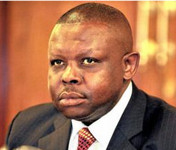
The very legitimacy of the judiciary is at stake if we do not get an evidence-based assessment of the complaint against Western Cape Judge President John Hlophe, says the writer.
The independence of the Concourt is implicated in justices Chris Jafta and Bess Nkabinde’s cowardice, says Eusebius McKaiser.
Johannesburg - Constitutional Court justices Chris Jafta and Bess Nkabinde should be ashamed of themselves. Are they trying to protect Western Cape Judge President John Hlophe from possible sanction for alleged judicial misconduct? If not, why do they instruct their lawyers to run technical arguments for why a judicial misconduct tribunal shouldn’t proceed?
Or do they fear career reprisal if Judge Hlophe should be toast in the end, even though they secretly might hope allegations against him get a full airing? Whatever is going on here, it doesn’t bode well for our confidence in the independence of the judiciary.
Here is the quick version of the back story to my concerns. Apparently, back in 2008, Judge Hlophe approached justices Jafta and Nkabinde and discussed with them the Zuma/Thint matter in which judgment was pending. The Concourt signed a complaint against Judge Hlophe, and justices Jafta and Nkabinde were happy to be signatories to that complaint.
The tribunal now needs to determine whether an innocent collegial conversation took place – and so dismiss the desire by some to see Judge Hlophe sanctioned for judicial misconduct – or whether Judge Hlophe had improperly tried to influence the outcome of a Concourt case – and so recommend sanction.
Surely we must get to the bottom of this nexus question? If we don’t, we can never know whether Judge Hlophe is innocent or guilty of misconduct. And if we don’t settle that question, then the public can rightly doubt his credibility, and the judicial division he is in charge of.
In other words, the very legitimacy of the judiciary is at stake if we do not get an evidence-based assessment of the complaint against Judge Hlophe.
Making the case go away will help Judge Hlophe. He gets to chill, and live another day as judge president.
But let’s ask about the cost to society of this tribunal shutting down, and not assessing the substantive complaint. It means a public can doubt whether a very senior judicial officer, John Hlophe, is fit for judicial office.
Confidence in our judiciary, in the event that the matter is not heard fully, will be negatively affected. The substantive issue must therefore be assessed fully, and openly.
In fact, viewed through this wider lens, I was being hasty a few lines back. It is not in Judge Hlophe’s own interest to avoid a full airing of the complaint either. Because if he is innocent – which one has to assume until proven otherwise – then he surely wants the public to not doubt his innocence?
But if Judge Hlophe knows he is innocent, and he knows that it is bad for him and the judiciary that his innocence be doubted, then why on earth not subject yourself to cross-examination and forensic assessment of the evidence? An innocent man shouldn’t fear the law of evidence, should he?
My biggest disappointment, however, is with justices Jafta and Nkabinde. Many of us who comment on the Concourt, and Concourt justices, are in love with our highest court and its employees.
They do brilliant work and have a jurisprudential archive that, though not always consistent, is damn impressive. It’s worth bragging about.
But this also means we must be vigilant when Concourt justices slip, and say so. Precisely to ensure the court’s continued independence, and to demand consistency in the standard of their work, and the behaviour of the justices doing the great work.
To that end, I think we should collectively be dismayed that justices Jafta and Nkabinde instructed their lawyers to argue, along very boring but fairly good technical grounds, that the tribunal basically should not be hearing this case because there was no proper complaint from them against Judge Hlophe.
The lawyers are explaining how complaints have to arise in terms of the Judicial Service Commission Act that had been amended, and suggest that on the facts before the tribunal, no complaint had been, in effect, lodged by justices Jafta and Nkabinde in their individual capacities as justices. There isn’t a statement of oath or affidavit to that effect from them either.
Retired Judge Joop Labuschagne dismissed these arguments without offering reasons, and now justices Jafta and Nkabinde want his decision reviewed. I think they have good grounds, procedurally, for reviewing the decision.
But why do that justices Jafta and Nkabinde? Take the public into your confidence and tell us your fears of going ahead with a full airing of the complaint? After all, if you did not feel improperly approached by Judge Hlophe, why did you alert your Concourt colleagues to what had happened? And why did the entire court complain about him subsequently?
Those undisputed facts mean justices Jafta and Nkabinde did, on their version of the facts, feel that Judge Hlophe interfered improperly with their work. And so there is no way of avoiding the perception that justices Jafta and Nkabinde want to now pretend they didn’t blow the whistle. And the million-dollar question is why?
Whatever the answer, the very independence of the Concourt itself is implicated in justices Jafta and Nkabinde’s cowardice. A real shame for such an auspicious court.
Picture by: Bongiwe Mchunu
Eusebius McKaiser hosts Power Talk With Eusebius McKaiser on Power 98.7, weekdays 9am till noon. Eusebius McKaiser graduated from Rhodes University.
The views expressed here are not necessarily those of Independent Newspapers.
By Eusebius McKaiser
Article Source: The Star
